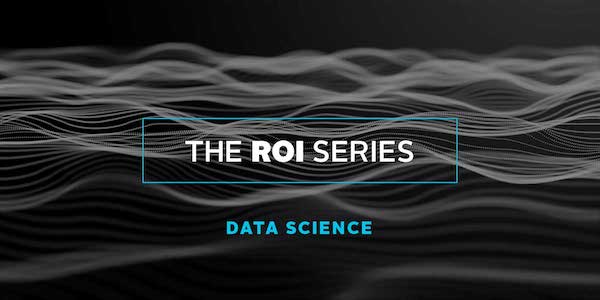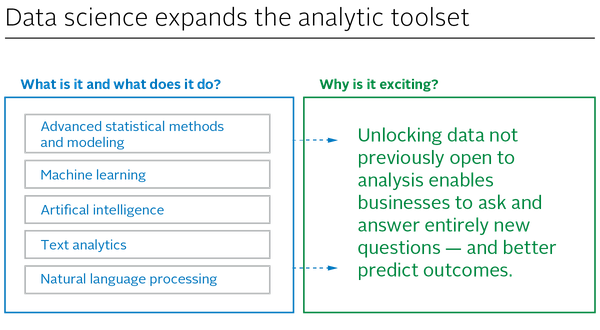
“Data science” is a term unfamiliar to most marketers. I believe it should—and will—be given more attention because in my view it can be a true game-changer. This highly evolved form of analytics can, if employed properly, open the door to new actions that optimize the return on brand investment.

To improve ROI look forward, not back
When CMOs think of ways to optimize ROI they generally turn to tried-and-true metrics. What was the response rate on a campaign? What net promoter scores are we achieving? How many clicks is the website getting? Measurements such as these are valid, but they all have one thing in common: they’re retrospective.
Marketers look at dashboards and reports, and use that historical data to decide what to do next. That’s the way it’s always been done, but it’s as much art as science. It’s future planning based on hindsight.
What intrigues me about applied data science is its potential to proactively solve targeted business problems. Adding machine learning, AI, unstructured data and models that leverage these new elements to structured operational data opens up completely new areas of exploration, making it possible to predict the future more confidently and forecast more accurately. It’s a shift from understanding what happened to understanding why it happened: going beyond correlation to reveal causation.
This predictive foresight is a fundamental driver of improved ROI on brand investments. Using evidence-based prescriptive intelligence to drive action brings the solution closer to the challenge. That boosts effectiveness from the outset, meaning less money spent for more benefit.

Let’s take a look at a specific example: customer churn. What specific actions does a business have to take to boost retention? An analysis of customer attributes and the actions they’ve taken reveals something about the those who leave compared to those who stay, but that macro-level insight is very broad. Digging in to both the structured and unstructured data, however, can help marketers connect the dots and change outcomes. Spotting an unhappy customer early makes it possible to take preventive steps before that customer leaves…and may even prompt that customer to become a brand advocate, simply because the company came through in a pinch.
Getting ahead of problems can have effects that extend across the business. It’s about more than driving sales or improving retention. It might be a manufacturer tracking problem reports to predict warranty claims, or a bank being able to spot anomalies and abnormal behavior to combat fraud. All of this ultimately comes back to the brand because how a business responds to challenges has a real impact on reputation: the brand benefits from the halo effect of a better-run business.

To better meet your customers’ needs, listen to them
There’s a treasure trove of useful information in the voice of the customer, contained in everything from market research and survey responses to emails, chats, reviews and customer service transcripts.
What data science allows CMOs to do is marry those open-ended comments with operational data to generate insights not typically available from structured data. The voice of the customer adds vitally important context.
There’s a lot of promise in the natural language processing space. By using machine learning and AI, it’s possible to uncover trends and patterns in speech and how people are talking about you. What’s the buzz on social media about your brand? What’s the reaction to your latest product announcement? Are people singing your praises or taking shots at you? Taking these learnings from the realm of random anecdote to rigorous analytic insight and linking actions to outcomes can be an incredibly powerful strategic planning tool.
You can start from anywhere
The sophisticated capabilities described here may seem inaccessible, but that’s far from the case. Data science is inherently scalable because it’s a methodology, not a rigidly defined solution. Whatever data is available can serve as the core of an emerging data science capability. For example, customer reviews are available across ecommerce platforms but the scale and complexity would be hard to resolve insights. Using AI and Machine learning is both time and cost efficient, and in this case, get marketers closer to the voice of the consumer. Traditional research methods just can’t achieve this level of efficiency.
Data science extracts relationships between variables in a way that simply is not possible using reporting and planning tools such as spreadsheets. It’s about taking available data and mining it in a new way to get at what’s driving the outcomes that traditional methods are already reporting. Making more data available and adjusting the models accordingly extends the potential.
Unanswered business challenges are the true starting point. Experience has shown us that businesses are sitting on a wealth of information, but that the value of that data often goes unrecognized. They have questions that seem impossible to answer, while in reality everything needed to find the answers already exists—it just needs to be looked at in the right way.
There’s more to explore
Tenet Partners has a Data Science practice for marketers, rooted in advanced analytics and driven by analytic expertise. To find out more, visit our Data Science offering page.
